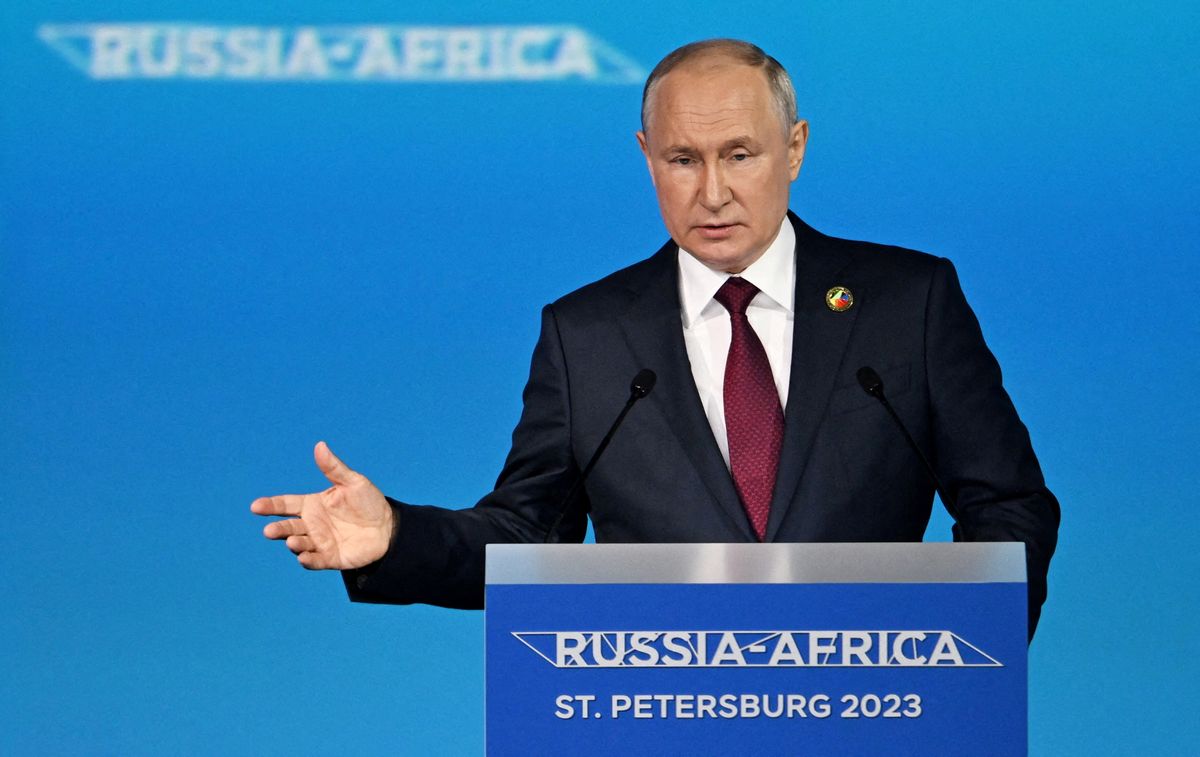What’s going on at the Russia-Africa Summit?
On Thursday, Russian President Putin opened the second-ever Russia-Africa Summit in St. Petersburg.

A few minutes every morning is all you need.
Stay up to date on the world's Headlines and Human Stories. It's fun, it's factual, it's fluff-free.
As African countries are developing economically and industrially, world powers are seeking allies, economic partners and collaborators on the continent. The West and Europe are heavily involved in the region. China has started to gain influence there, too, especially by lending money to different countries. But Russia is also trying to get its foot in the door. One way it’s doing that is by getting involved in security, with the Wagner group offering military support in places like the Central African Republic, Libya and Mali.
More recently: The first (and last) Russia-Africa Summit was held back in 2019, and 43 African leaders attended the conference. The idea behind the summit is to boost cooperation between Russia and African countries across a range of sectors, including politics, security, economic relations, science and technology. A lot has happened since then, including the COVID pandemic and Russia’s invasion of Ukraine, so it hasn’t been held again since that first meeting.
Last February, Eritrea and Mali (and seven other countries) voted against a UN General Assembly resolution calling for Russia to leave Ukraine. The Central African Republic and Zimbabwe abstained, and Burkina Faso was absent from that vote. But Somalia voted in favor of it. In the past year, Somalia, Eritrea and Mali have gotten food shipments from Russia.
With the recent crash of the Black Sea grain deal, the general African food supply and economy could end up suffering, especially because a lot of that grain ended up in countries dealing with food shortages. Still, most African countries are uninterested in getting involved in the Russia-Ukraine war.
The development: On Thursday, Russian President Putin opened the second-ever Russia-Africa Summit in St. Petersburg. This year, only 17 African leaders attended this two-day event, according to Russia, which is less than half of the first summit’s tally. Security talks are one major focus of this meeting, and experts expect more clarity on the security partnerships between Russia and these countries.
Apart from that, the grain deal has already been spotlit. Some African leaders are frustrated over Russia’s decision to leave the deal. A lot of African countries rely on Ukraine and Russia for grain – for example, Somalia and Eritrea source more than 90% of the wheat they need from the two countries.
In his speech at the summit on Thursday, Putin promised tens of thousands of tons of grain to six countries. To make up for the collapse of the grain deal, Russia is basically pledging to replace Ukrainian grain exports to these countries. But in his speech, Putin didn’t mention other food-insecure countries like Sudan and Chad, which don’t have close ties to Russia. Zimbabwe’s president expressed thanks but said that his country doesn’t need the grain and is food-secure.
Key comments:
"We will be ready to provide Burkina Faso, Zimbabwe, Mali, Somalia, Central African Republic and Eritrea with 25-50,000 tonnes of free grain each in the next three to four months," Russian President Putin told the summit.
“Russia is trying to still position itself as a benevolent partner to emerging and developing economies, trying to mask the fact that it’s removing about 2.5 million tons of grains per month from the global market,” said Evghenia Sleptsova, senior economist at Oxford Economics.
“For Russia to be the host of a summit that generates strong showing of African leaders, would be a diplomatic coup,” said Joseph Siegle, director of research at the Africa Center for Strategic Studies, an institution within the US Department of Defense. “It will be able to convey that it's business as usual. The recent insurrection with Wagner was just a bump in the road.”
"I shouldn't say that Russia is right or wrong. It acted for its own reasons; now we need to hear them in order to try to move forward,” said Comoros President Azali Assoumani, chair of the African Union, according to Russian state news agency RIA.




Comments ()